Practically everyone has hobbies that occupy some portion of their free time. For those into fitness, it could be running, rock climbing, cycling, or competing in triathlons. If less strenuous activities are desirable, maybe it's cooking, reading, or binge-watching a favorite Netflix series.
Regardless of where or how we spend our time, hobbies can take a large chunk from our bank accounts.
We surveyed 1,015 people in the U.S. of various income levels to determine their favorite hobbies and how much they typically spent on them.
Before you head out for your five-mile run or catch up on the new season of your favorite drama, take a look at how others spend their time and resources. Who knows, you may want to take up another hobby or re-prioritize what you spend on your favorite activities.
Big Bucks Means Expensive Hobbies
There's no question how much you make level plays a role in what hobbies you enjoy and how much you spend on them. But regardless of income, reading and watching TV topped lists. In fact, reading is not only popular in America but also it's the most popular hobby worldwide.
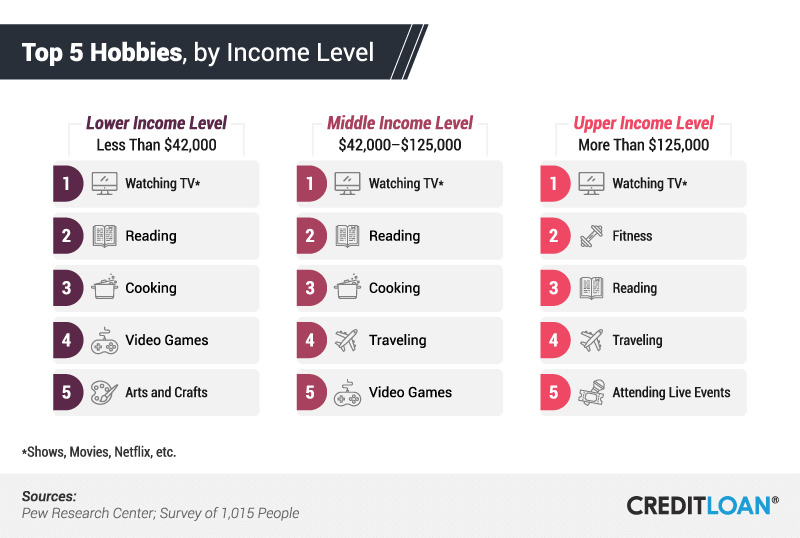
For higher-income participants, fitness ranked second, followed by reading, traveling, and attending live events such as concerts and plays.
Interestingly, in a recent poll of super-wealthy individuals – defined as those with assets of $30 million or more, 31% said traveling was high on their list. And given the level of resources the ultra-wealthy have at their disposal, collecting art and fine wine were also favorite pastimes.
Middle- and lower-income earners shared many hobbies like playing video games, and cooking. Since many Americans eat at least three meals each day, cooking as a hobby may also help trim a monthly food budget.
A hobby that resonated with lower-income earners but not with the middle- and upper-income groups was arts and crafts. Purchasing supplies to make baskets, blankets, and other items are relatively inexpensive and can lead to a tidy profit if sold at craft fairs or online.
Paying to Play
You've probably heard it said, "You've got to pay to play." Wanting to engage in a hobby is one thing, but having the available resources may limit what hobbies someone can enjoy.
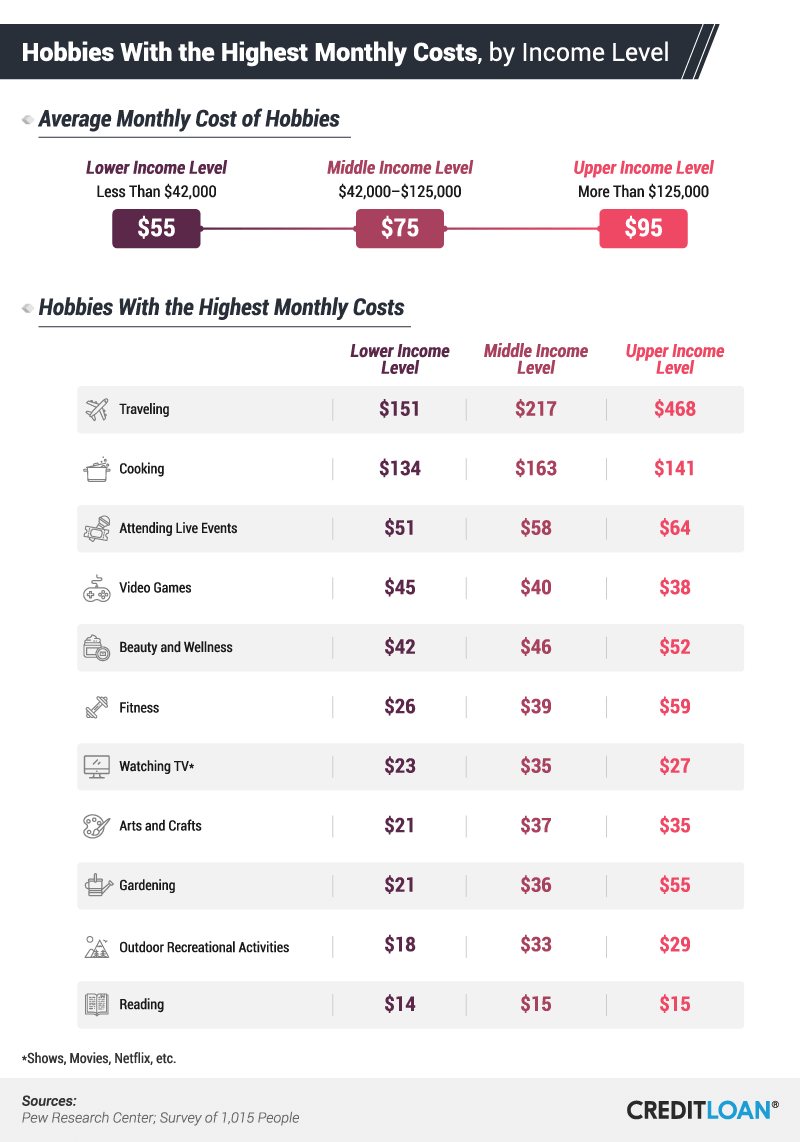
There is no question travel is a popular hobby – or at least a desired hobby – among people of all income levels.
After all, who doesn't want to lie on the pure white sand of an exotic Greek Island, explore the pyramids of Egypt, or attend a world-class soccer championship in Europe or South America? Unfortunately, it takes money, and often plenty of it, to enjoy these luxuries.
Participants across the three income levels all spent the most on travel. Those in the upper-income bracket spent around $468 a month on average, while middle-income participants shelled out $217. Lower-income earners spent $151.
When it comes to the amount each income level spent on cooking, the differences weren't significant. In fact, middle-income earners spent the most at $163 per month. The upper-income level spent slightly less at $141, but only marginally more than lower-income earners who spent $134.
According to a recent survey on American cooking preferences, 31% said the primary reason for cooking at home was cost. Eating out, even at fast-food or lower-cost restaurant chains, can quickly add up and take a bite out of your budget.
For example, if you eat lunch out every workday and spend an average of $10, that's $2,500 per year. But if you prepare and bring lunch from home, your average cost drops to $6.30 per meal. For individuals or families on a budget, food cost can definitely impact their bottom line.
There were a couple areas we noticed where income wasn't a factor, though.
While higher-income earners spent about $52 each month on beauty and wellness, only $4 separated middle- and lower-income earners at $46 and $42 respectively. And keep in mind the $10 difference between upper and lower earners could be the cost of a bottle of shampoo or moisturizer.
What we found most intriguing was the amount each group spent on reading. We saw only a $1 difference between the three. The upper- and middle-income groups both spent $15 a month, whereas the lower-income group spent $14.
Everyone from parents to elementary school teachers and college professors has proclaimed the benefits of reading. But another reason is that while lower-income earners may not have the funds to travel to luxurious destinations, they can quickly pick up an engaging novel and whisk themselves off to far-away places that capture a dazzling landscape.
Wish List Hobbies
Many of us occasionally allow our minds to dream about hobbies we would enjoy or fun destinations to visit, and according to experts, daydreaming can have a positive impact on your mental health.
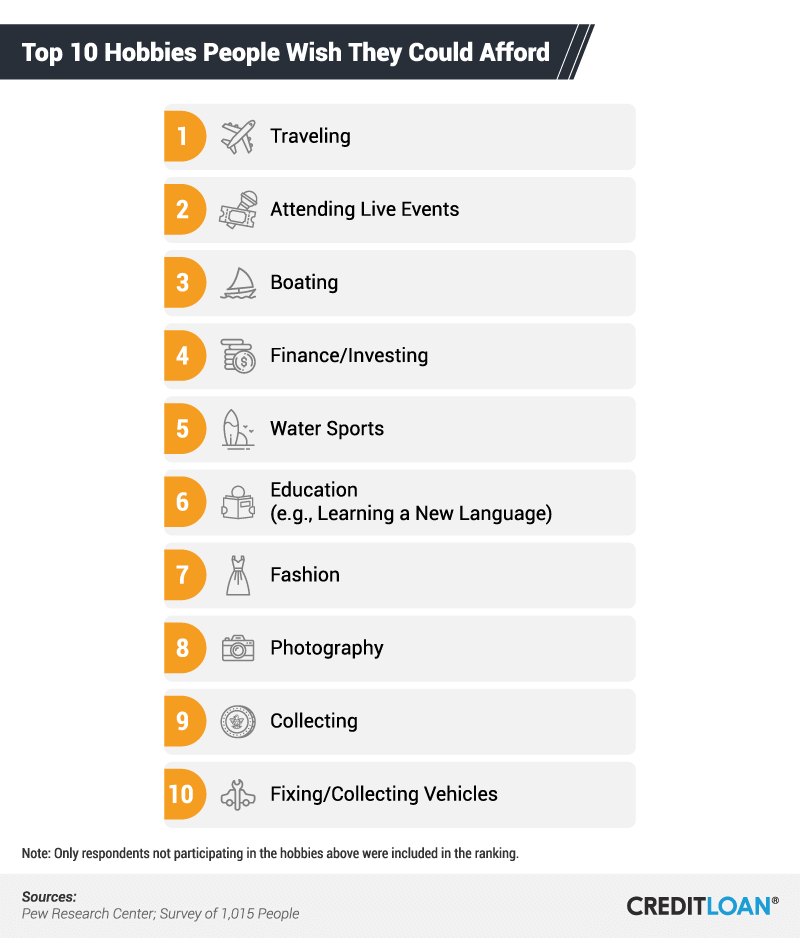
We asked our participants what hobbies they would like to but don't presently engage in. Here, we find travel again. Almost everyone would travel more if they could afford it.
Attending live events like sporting events was another wish list hobby. Money, or lack of it, can be a hindrance to seeing these hobbies materialize.
For example, the average cost for a family of four to attend an MLB game can quickly climb over $150 when paying for tickets, food, parking, and maybe a couple of caps.
However, the cost to attend a minor league baseball game for a family of four is about $66. Not bad for four tickets and hot dogs, two beers, two sodas, and parking.
Summer also means a lot of great live music and tours, and if you're looking to catch acts such as Ed Sheeran, Kenny Chesney, Bruno Mars, or Jay-Z and Beyoncé, then prepare to shell out some cash. Individual ticket prices can easily exceed $100, and throw in a T-shirt and a few beverages, and you may need an extra side gig to supplement the cost.
Other hobbies people wished they could afford included boating, finance/investing, and water sports such as wakeboarding, scuba diving, or surfing.
If wakeboarding and wakesurfing appeal to you, forget about using your dad's 15-year-old pontoon or fishing boat.You'll need a boat specifically designed to produce a wake ideal for these activities. Depending on the year and condition, a late-model ski boat could run from $90,000 to over $150,000, and that doesn't include any equipment, insurance, fuel, or storage.
If We Only Had More Money
Just because people enjoy traveling or attending live entertainment events doesn't mean they don't want to spend more on these hobbies. Unfortunately, bank accounts and credit cards have their limits.
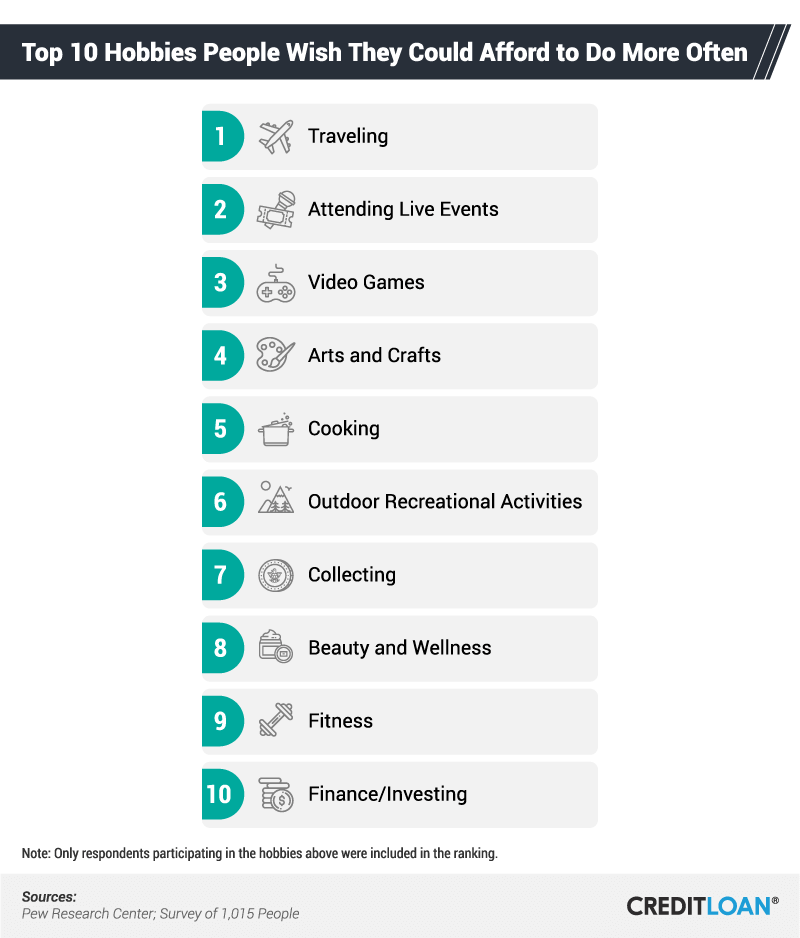
You can't miss the fact that people across all income levels can't travel enough or see too many live events because most reported wanting to book another trip or see another sporting event or concert.
What hobby do you currently have that you would like to expand on if money were no object?
Video games captured the third spot, followed closely by arts and crafts. Other hobbies people would spend more on if they could were cooking, outdoor recreation, and collecting.
But wait, what if a hobby or outside interest could make you some extra cash?
We ran across a list of hobbies, including favorites such as cooking, making homemade crafts, gaming, and even traveling that have the potential to produce income.
Cooking is a good example. Do you have a specific food or recipe that is delicious and your friends are always asking about? Some people decided to start blogs and, in the case of The Pioneer Woman, have turned simple hobbies into six- and seven-figure businesses.
Not All Hobbies Last a Lifetime
We already know having one or multiple hobbies is good. Many of them expand our horizons, keep us fit, and in some cases, can earn us extra cash. But most hobbies run their course sooner or later.
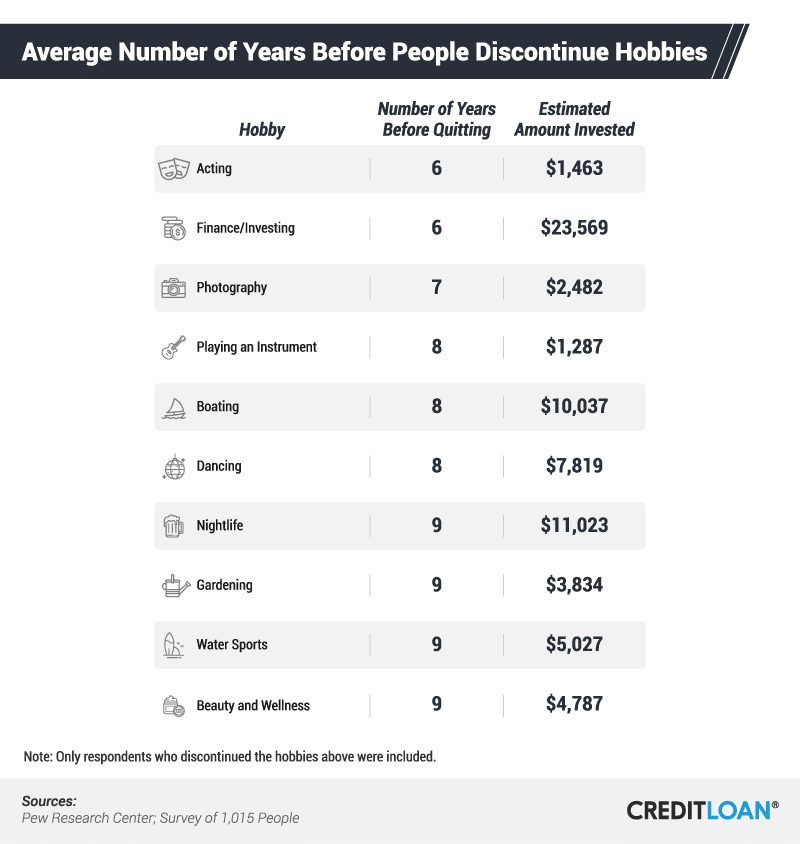
Take finance and investing. Buying and selling securities can be fun and profitable, but our participants who considered it a hobby usually quit after six years, spending an estimated $23,569 over the duration. Hopefully, they netted some gains with quality investments.
Here's a hobby we haven't touched on yet: acting. Many of us have friends who enjoy participating in local theater groups. You may even know someone in Los Angeles or New York who is working hard to land a role in a Broadway play, TV series, or the next blockbuster movie. Like investing, our survey showed aspiring actors stopped after about six years.
Other hobbies people stayed with a little longer were playing an instrument, boating, and dancing at eight years, followed by gardening and watersports, which had nine-year spans.
Boat owners sometimes say the best two days of their nautical life are the days they buy and sell their boats, an apparent reference to the cost of owning and operating a boat. As for dancing, well, our knees and ankles can only take so much before switching to a lower-impact activity starts to makes sense.
Giving up after-hours hobbies such as hanging out in bars and clubs not only leaves time for much-needed sleep but also allows you to stash away more cash. Those surveyed estimated they spent slightly over $11,000 drinking many evenings away.
Reasons to Move On
How often have you heard the phrase, "All good things must come to an end"? In the case of hobbies, it's not that they must end – sometimes there are compelling reasons why they should.
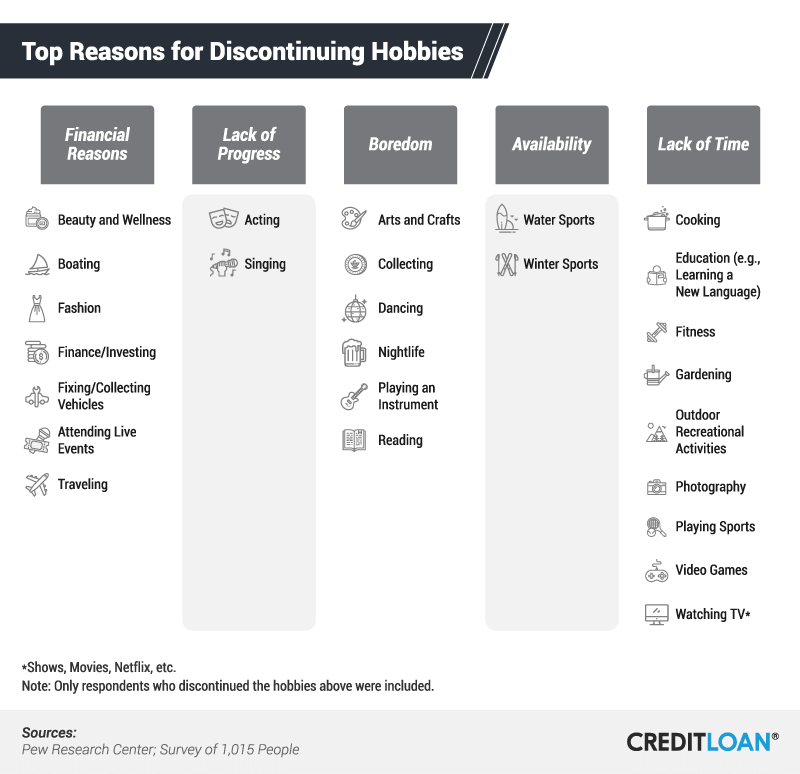
If money or finances is the reason we cannot take up a hobby or enjoy it as much as we would like, it's also a major reason why people discontinue a hobby.
We've already touched on the cost of owning and maintaining a boat. It comes as no surprise that those surveyed gave financial reasons as the main reason for selling their water toy.
Remember our travel enthusiasts? Financial reasons were why many decided that spending more time at home might not be a bad idea.
Finances also played a role in why a large portion of participants who enjoyed fashion and clothing as a pastime decided shopping bargain bins might not be such a bad idea either.
And when getting Botox shots and twice weekly massages and pedicures became too pricey, beauty and wellness fans found other interests.
But money isn't the only reason we move away from hobbies we once enjoyed. Two other reasons were boredom and a lack of time.
For those who enjoyed emulating the recipes of their favorite TV chefs, a lack of time was the reason many hung up their aprons.
Giving up a hobby because of finances, boredom, or even a lack of time are why most of us move on to other activities. However, for those who spent their time singing or acting, it wasn't money, time, or boredom that convinced them to stop – it was a lack of progress.
Maybe the grind of rehearsal or being rejected countless times for trying to co-star alongside Julia Roberts or open concerts for Taylor Swift does eventually wear you out.
Hobbies Add Value to Our Lives
People engage in a lot of hobbies, and we only touched on some of the major ones like travel, fitness, beauty, fashion, and a handful of others.
The bottom line is that hobbies not only allow us to spend our free time wisely, but also they're good for our health. Studies show people who pursue their interests live a more well-rounded and satisfying life.
Hobbies can also give you additional skills for work, give you a reason to spend time with friends or family or even allow you to make extra money.
If for any reason you don't have a hobby, now is a great time to learn a new language, play the guitar, or lose a few pounds. Remember, not every hobby costs a lot of money, and who knows, you may even discover a new passion in the process.
Methodology
We collected survey responses from 1,015 people from Amazon's Mechanical Turk. 49.4% of participants were male, and 50.6% were female. Participants ranged in age from 18 to 82 with a mean of 36.5 and a standard deviation of 12.2. We supplemented our survey with data from the Pew Research Center. These data allowed us to group our survey respondents by income level. We calculated the estimated amounts invested by taking each hobby's average monthly income and multiplying it by 12 and then the number of months a hobby lasted.
The data we are presenting rely on self-reporting. There are many issues with self-reported data. These issues include but are not limited to the following: selective memory, telescoping, attribution, and exaggeration.
Sources
- https://www.creditloan.com/blog/average-american-spends-on-entertainment/
- https://www.toplst.com/top-15-of-the-most-popular-hobbies-in-the-world/
- http://www.businessinsider.com/billionaire-hobbies-richest-people-2017-6#8-health-and-exercise–148-13
- https://www.thewaystowealth.com/make-money/hobbies-that-make-money/
- https://www.forbes.com/sites/erikkain/2017/12/16/the-best-selling-video-games-of-2017-so-far/#49412374ab2b
- https://www.lifehack.org/469716/love-crafting-4-ways-to-turn-your-hobby-into-a-business
- https://www.reportlinker.com/insight/americans-cooking-habits.html
- https://www.usatoday.com/story/money/personalfinance/2017/09/27/90-americans-dont-like-cook-and-its-costing-them-thousands-each-year/708033001/
- https://www.indiatimes.com/lifestyle/self/15-reasons-reading-is-the-best-hobby-ever-254017.html
- https://www.psychologytoday.com/us/blog/supersurvivors/201712/why-daydreaming-is-good-us
- https://www.billboard.com/articles/news/8310011/summer-concert-tours-2018-hottest-list
- https://www.creditloan.com/blog/do-you-hustle/
- https://www.malibuboats.com
- https://www.shopify.com/blog/make-money-from-your-hobbies
- https://www.mashed.com/119275/pioneer-woman-really-makes-money/
- https://www.theodysseyonline.com/to-the-one-who-has-multiple-hobbies
- https://www.creditloan.com/blog/investment-mistakes/
- https://www.moneytalksnews.com/7-tips-for-buying-boat-without-sinking-your-finances/
- https://www.jacobinmag.com/2017/06/fast-fashion-labor-prada-gucci-abuse-designer
- https://greatist.com/live/why-i-quit-following-my-dream
- https://www.medicalnewstoday.com/articles/320715.php
- https://www.creditloan.com/blog/work-life-trade-offs/
Fair Use Statement
If reading about these activities might encourage others to start a new hobby and you feel this information is insightful, we encourage you to use it for any noncommercial purposes. The only favor we'll ask if that you give credit to CreditLoan.com and to the good folks who put it together.
